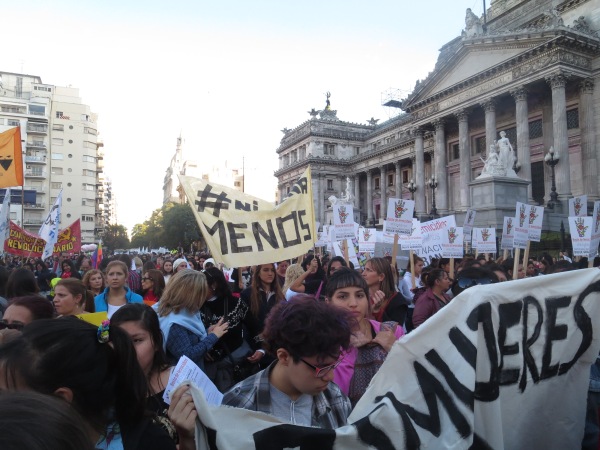By Brenda Werth* and Fulton Armstrong

Protesters gather in Buenos Aires, Argentina as part of the NiUnaMenos movement, which has sparked mobilizations across the country and in many other Latin American cities. / Wikimedia / Creative Commons
Protesters have taken to the streets in Argentina and elsewhere in Latin America to raise awareness about violence against women and girls, pushing for an end to machista culture. News media estimate that a demonstration under the banner of NiUnaMenos – “not one less woman” due to femicide – in Buenos Aires last Wednesday drew tens of thousands of supporters dressed in black, despite freezing rain. Other banners declared “We want to live” and demanded “No more machista violence.” The immediate issue driving the protest was the brutal attack earlier this month on a schoolgirl in Mar del Plata – 16-year-old Lucía Pérez – who was drugged, raped, and tortured to the point of suffering cardiac arrest and died from internal injuries.
- Argentina passed laws between 2008 and 2012 protecting a range of rights relating to human trafficking, violence against women, marriage equality, and gender and sexual identity, creating new space for discussion of the issue. But the Casa del Encuentro, an NGO that helps victims of gender violence, says that data through 2015 indicate that somewhere in Argentina a woman is killed every 30 hours. The government’s Secretariat of Human Rights says that 19 women and girls were murdered in the first 18 days of October. Argentine President Macri, challenged since early days of his administration to address the problem, has reiterated pledges to push legislation that would establish a hotline for reporting abuse and create more shelters for abused women as well as better ways of monitoring abusers.
Similar protests were held in Peru, Mexico, Bolivia, Chile, Paraguay, Uruguay, and El Salvador – with thousands of protesters in capital cities demanding an end to the systematic violation of women’s rights. Chilean President Michelle Bachelet announced last week that she was joining the NiUnaMenos movement. She condemned the murder of a 10-year-old girl asphyxiated, burned, and buried by her step-father. Movement organizers cite research showing that violence against women is a serious problem in much of Latin America. The Mapa da Violencia published by FLACSO Brazil last year shows that seven of the 10 countries with the highest female murder rate are in this region – with El Salvador (8.9 homicides per 100,000 women), Colombia (6.3), Guatemala (6.2), and Brazil (4.8) near the top of the list.
The demonstrations reflect growing global awareness of gender violence as a violation of human rights and that legislation, while helpful, is not enough. NiUnaMenos and other groups are also rewriting the traditional definition of violence against women as attacks perpetrated by strangers rather than boyfriends, husbands, or family members – just as coverage of femicide in Mexico in the 1990s raised public awareness of gender violence as systematic and deeply structural as opposed to “every-day,” “familial,” and “private.” NiUnaMenos is challenging “the culture of violence against women” in machista societies and condemning “the men who think that a woman is their property and they have rights over her and can do whatever they want.” In Argentina, the mainstream media have stimulated much of the backlash, with reporting that exploits private details of victims’ lives and portrays victims in a manner that suggests responsibility for the crimes committed against them. This recycling of the “algo habrá hecho” logic that circulated freely during the dictatorship coincides with a renewed focus in Argentine society on cases of torture during those years, treating them specifically as acts of sexual violence. A week or two of protests obviously will not change ingrained culture, but the burgeoning movement highlighted by NiUnaMenos offers hope of continued progress in protecting the fundamental rights of women throughout the hemisphere.
October 24, 2016
* Brenda Werth is Associate Professor of World Languages and Cultures at American University.
